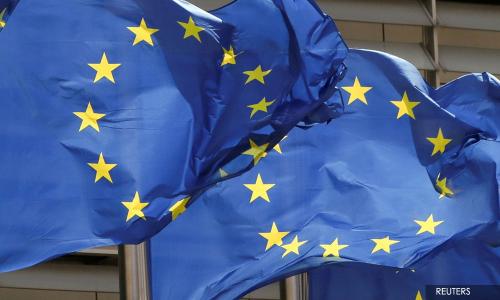Energy crunch pits Germany against frustrated EU leaders seeking gas cap
Several countries aired frustration yesterday with Germany's refusal to cap gas prices as European Union leaders looked set to end yet another debate on the bloc's response to the energy crunch without agreement on the issue.
The EU is grappling with high energy prices driving inflation and raising the prospect of recession across the continent, a situation aggravated by Russia cutting gas flows following its February invasion of Ukraine.
The 27 countries have already agreed to fill gas storages and claw back revenues from energy firms to spend on helping consumers with crippling bills.
At the Brussels summit, they are expected to back proposals to launch an alternative price benchmark for liquefied natural gas and voluntary joint gas buying, although laws to make this happen will need to be negotiated over the coming weeks.
But Germany, the biggest EU economy, leads a small camp refusing calls from 15 countries to cap gas prices, saying it would risk suppliers freezing Europe out, and reduce incentives for energy saving.
"We are asked to show solidarity in sharing energy but there is no solidarity on our calls for containing prices," Italy's prime minister, Mario Draghi, told his peers, according to an EU official familiar with the closed-door discussions.
Prime Minister Alexander de Croo of Belgium, which exports gas to neighbouring Germany, shared the frustration.
"Solidarity should not just be on supply - it should also be on prices," he told the gathering, according to the official.
A draft of the leaders' summit conclusions, seen by Reuters, would ask the EU's executive to "take work forward" on both a "temporary dynamic price corridor on natural gas transactions" and a price cap on gas used to generate electricity.
It said this should include a "cost and benefit analysis" of capping gas prices for the power sector, reflecting concerns of some that it could boost gas use or divert electricity exports to non-EU countries like Britain that do not have the cap.
'A long night'
Discussions among the leaders continued over dinner and past midnight.
Anticipating protracted talks over the gas price cap question, Dutch Prime Minister Mark Rutte told journalists as he arrived in Brussels: "I think we could be in for a long night."
While Rutte opposes a cap, Spanish Prime Minister Pedro Sanchez made clear he was "not leaving without conclusions that will send the right signal" on prices, said the EU official.
Spain and Portugal have already capped the price of gas used to produce power domestically, and France is keen to expand the scheme EU-wide. Separately yesterday, the two also agreed with France to build a sea-based pipeline between Barcelona and Marseille.
Such regional initiatives highlight EU countries' diverse energy mix and interests, suggesting the leaders' meeting risks falling short on joint short-term action to tackle high energy prices ahead of winter.
Beyond disagreements over a ceiling on gas prices, the leaders were also at odds over spending plans by countries with the deepest pockets to help their industries and households through the energy crisis, which others complain are unfair and undermine competition on the bloc's single market.
Chancellor Olaf Scholz, defending his country's unmatched €200 billion (RM925 billion) support package, said Germany had acted in solidarity with other EU members during Covid-19 and pointed to other countries also supporting energy consumers.
"But of course, we have to look closely at what we decide to ensure that it works," he said as he arrived for the summit. "We need to carry this off together."
- Reuters
RM12.50 / month
- Unlimited access to award-winning journalism
- Comment and share your opinions on all our articles
- Gift interesting stories to your friends
- Tax deductable

